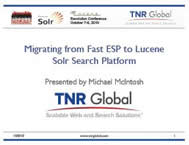TNR Global Launches Search Application for Museum Collections
TNR Global is launching the alpha version of a search application designed specifically for museum collections. Museum Collections Search is any application for digitally searching a museum’s collection. This can be made available to the public or used by only the internal staff for curation, and can be made available to a selected professional or research audience. Our White Paper explains the application in more detail.
Collections Search adds tremendous value to the research community and is often in line with the educational mission of many museums. A search feature is a resource for students and researchers, and can expand the overall audience by reaching people separated by distance or with limited physical mobility. When the public finds items in your collection like historic letters, photographs of items, and other catalog items through you search function, it can increase interest and traffic to the museum’s site and physical collection.
While the ability to search a museum collection for is a way to bring immense value to the museum and the community that supports it, intellectual property is an ongoing concern for curators within the museum community. TNR Global recognizes this and has technologies to address access to material. When setting up a search, ease of use or understanding and responsiveness are addressed, also issues of ownership or privacy all combine to determine the search technology chosen and how it is applied. The search realm and results can be tailored based on the user. By defining the audience (or audiences) for the collection and the search, we can structure the presentation of the results. The public view can be a more restricted display, while protected view and can be more expansive and detailed.
We use open source search technology that works with most museum software systems and databases including the popular museum software product PastPerfect. We customize our search solution specifically for your collection and optimize search results for the most relevant results to queries.
TNR Global has a long history with the museum community. Our CEO is Principal of the organization We Love Museums and is a member of dozens of museums worldwide. He is involved with a number of archival and curatorial indexing projects. He has merged his lifelong career in database and web technology with his passion for art, education, and history with creating a search solution to benefit museums and their patrons. To get started, contact us for an evaluation of your Museum Collection Search Project today!


